If you are considering a move to Morocco in the next year or two, here is a quick rundown of the pros and cons you want to know.
Find out what kind of cultural explosion you can expect when visiting Morocco for the first time.
Also, learn how easy it is to become a Moroccan by investing in your estate in the northern African country.
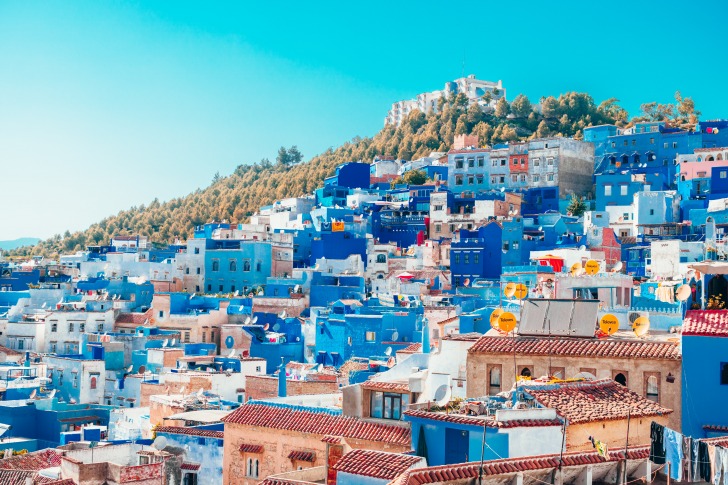
Contents [show]
Pros of Living in Morocco
1. Cultural Awakening
Morocco is full of cultures of all kinds.
Newly settled Spaniards and Jews followed the Moors who settled Morocco and became what is now Berber culture.
There are also a great number of Arabs living in Morocco, as well as Westerners from the US and Canada.
Whether you fit one of these cultural molds or are simply trying to find a huge melting pot of cultures, Morocco certainly ties one in.
Get drunk on cultural insight with the influences that weave throughout Moroccan history.
2. Saharan Desert Climate
If you are someone who wishes you owned a dune buggy and had a backyard filled with dunes, join the rest of Morocco.
Dune buggy riding is a lot of fun to indulge in, similar to snow tubing or sledding.
Of course, sand will end up in all those places you never imagined when you move to Morocco.
Plan to get sunburned while playing in the hot sandy dunes, too, due to that supercharged solar power.
3. Camels
Speaking of sand and dunes, the best way to travel across burning hot sand is with a camel.
Riding a camel is the cultural norm in Morocco.
There they depend on these drought-tolerant beasts for hauling their everyday burdens in the form of packs.
Prepare to hike up your long pants and scoot on the back of a one or two-humped animal.
Animal lovers will be both concerned and secretly thrilled to experience everyday life with such large mammals.
Camels will quickly become your taxi cab, and provide you with a lot of relief when walking on hot dunes.
4. Northern Africa
Ready to move to a new continent?
Consider Africa and the northwestern African country of Morocco.
Here you can be a sea apart from North America and experience a whole new world in so many ways.
Africa has sub-Saharan landscapes and elephants, lions, and tigers run wild and free.
You don’t see that every day in the US–unless you enjoy watching “Madagascar.”
Move to Morocco and go on a safari, or just sit and watch your new Moroccan backyard to see these animals in real life.
5. Mountainous Region
The area of Morocco is filled with mountains and valleys.
This makes for the perfect scenery for hiking and mountain biking.
For those who love the great outdoors, Morocco is an easy choice for a new home.
Plan to dress appropriately in loose-fitting pants and shirts, as well as a turban to cover your head.
The terrain in Morocco is wildly different in many ways.
6. Berber Rugs
A Berber rug is a distinctive type of carpet that is woven using a Moroccan kilim.
A kilim rug features a flat weave resulting in a super smooth texture.
You can find vintage kilims and new kilims that have never been used.
Moroccan rugs are unique to Persian rugs or Oriental carpets, but all three have some of the same features.
7. Moroccan Lamps
Have you ever seen a Moroccan lamp?
The style is quite distinctive with many colors of glass arranged in a clever pattern.
Similar to the Tiffany style of glass lampshades, Moroccan lamps are highly prized among collectors and homeowners.
These lamps also feature an onion shape at the top that is almost Russian.
Another key feature of Moroccan lamps is the use of brass for the trim and hardware, which adds a cool metal tone.
8. Cuisine of Morocco
Blame the Berbers, but the Moroccans sure do know how to cook good grilled sheep.
In addition, I am sure you have eaten a side dish of couscous, perhaps even Moroccan couscous.
This is a fancy pearl-shaped pasta that is made using semolina flour.
Other popular Moroccan foods you will be eating plenty of when living in the country are tagine-style stews, mint tea, and b’stilla, which is a layered pastry dessert filled with pigeons.
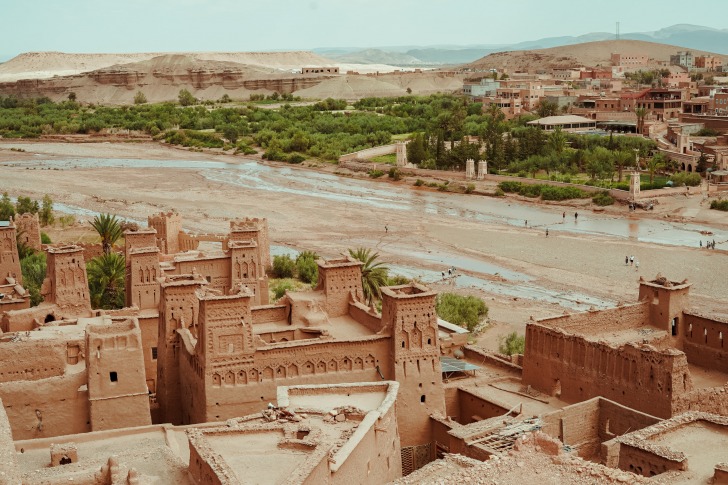
Cons of Living in Morocco
1. Eating Pigeon
Have you ever eaten pigeons?
I haven’t either, but the most popular dessert in Morocco contains this bird as minced meat.
Other strange foods you will need to get used to eating while living in Morocco include lamb’s liver, snail, sheep’s head, and spleen.
If you do not eat meat, you can avoid the mystery of what might be lurking in that hand pie.
2. Possible Terrorist Attacks
According to the US Embassy and Consulates in Morocco, the travel advisory for going to the country is elevated due to terrorism.
The travel advisor is in effect as of December 2022, which means this can change at any time.
The fact that this country is experiencing possible terrorism right now indicates this could be an issue in the future.
Therefore, check with the US Embassy and Consulates in Morocco before making any travel or moving plans to Morocco to avoid being a target of terrorists.
This potential for terrorism is a reason why you might not want to visit at all.
3. High Poverty Rate
Unfortunately, Morocco has a pretty high poverty rate.
The rate is about 30 percent as of 2022, which is comparable to the poverty in Kosovo, Bolivia, and El Salvador.
The current poverty rate in the US, on the other hand, is 11 percent, states the US Census Bureau.
Historically, though, the poverty rate in Morocco has been even higher.
The rate of poverty in Morocco was nearly 70 percent in 1984, and again at nearly 60 percent in 2000.
As someone who is American moving to Morocco, you may likely be living in a more poverty-ridden situation than you were in the US.
This is a result of the social system and bureaucracy and not something most individuals can challenge or change.
4. Petty Crime is Problematic
As a result of the high poverty rate, the level of petty crime that takes place in Morocco is equally as impressive.
Purse and bag snatchings are common, especially when discussing Westerners who are more likely to be noticed in a crowd of Moroccans.
If you are a woman, you should be cautious when traveling outside alone, particularly when dealing with ATMs and money exchanges.
5. Porn is Illegal
If you are making pornography or you are into looking at pornographic photos or videos, perhaps you have a sex addiction that could be cured by moving to Morocco.
How does this work?
In Morocco, it is illegal to own, much less make, pornographic material.
If you are watching gay porn, you are especially in the wrong.
Therefore, porn aficionados should avoid Morocco.
6. Thongs are Out
Forget about wearing scantily clad outfits to the pool, too, because the Moroccan culture is conservative and subdued.
Smart Traveller from the Australian government reports that you should also avoid wearing tight-fitting clothing in favor of loose garments.
This is in response to the conservative nature of the country at large.
The less skin that you show, the safer you will feel among the locals.
Otherwise, you could be targeted for wearing a thong bikini to the beach, for example.
7. Tattoos Lack Acceptance
Can you imagine living somewhere in this day and age where tattoos are not acceptable?
If you have your share of ink, you will get plenty of sharp looks and wide-eyed stares if you go to Morocco.
That is because Morocco does not socially accept tattooing as an art form.
There are few places to go to in the country to get a tattoo.
8. Religious Differences
Morocco, in terms of religion, is mostly Muslim.
As a result, many women wear a hijab, which is the scarf covering their head and neck.
Getting used to wrapping your head up in a hijab to fit in with the crowd can be quite a task.
In fact, as a Westerner, it might be best if you did not try to copy this style of headdress.
As the hijab is a Muslim tradition, only those who are representative of this religion should sport the covering out of respect.
That being said, you might be asked to cover your hair in certain instances, such as when entering a Muslim mosque.
Pros and Cons of Living in Morocco – Summary Table
| Pros of Living in Morocco | Cons of Living in Morocco |
|---|---|
| 1. Cultural Awakening | 1. Eating Pigeon |
| 2. Saharan Desert Climate | 2. Possible Terrorist Attacks |
| 3. Camels | 3. High Poverty Rate |
| 4. Northern Africa | 4. Petty Crime is Problematic |
| 5. Mountainous Region | 5. Porn is Illegal |
| 6. Berber Rugs | 6. Thongs are Out |
| 7. Moroccan Lamps | 7. Tattoos Lack Acceptance |
| 8. Cuisine of Morocco | 8. Religious Differences |
Morocco Safety Overview
READ THE FULL REPORT: Morocco Safety Review
Safety Index: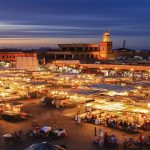
- OVERALL RISK: MEDIUM
- TRANSPORT & TAXIS RISK: LOW
- PICKPOCKETS RISK: MEDIUM
- NATURAL DISASTERS RISK: LOW
- MUGGING RISK: LOW
- TERRORISM RISK: MEDIUM
- SCAMS RISK: MEDIUM
- WOMEN TRAVELERS RISK: MEDIUM
Frequently Asked Questions
What is the national language of Morocco?
The two official languages of Morocco are Arabic and Standard Moroccan Berber.
The latter is also called Tamazight or Amazigh or simply Berber.
Which currency is preferred by Moroccan street vendors?
According to Frommer, the dirham is the preferred currency by Moroccan street vendors.
The currency abbreviation for the dirham is MAD or DH.
Does it snow in Morocco?
Yes, surprisingly to many it does snow in Morocco.
There is enough snow, according to NASA, that Morocco has two ski resorts.
These are located in the big city of Marrakech and the smaller Alpine town of Ifrane.
The best time of the year to see snow in Morocco is in January and February.
Can I move to Morocco from the US?
Yes, but there are a lot of steps to take.
For new residents of Morocco from the US, the individuals must register with the local Moroccan police department within 90 days.
This involves having your passport, bank statements, criminal record check, and medical certificate.
In order to become a Moroccan resident, you need to be related to someone who is Moroccan or live in the country for a long time.
Is it easy to buy a house in Morocco as a foreigner?
Yes, it is easy to buy a house in Morocco if you have the money to afford one.
However, buying actual land on Moroccan soil is against the law for foreigners.
The only consideration is that mortgages for anyone who is not Moroccan only cover 70 percent of the total cost of the home.
That means you would have to pay a 30 percent down payment no matter what.
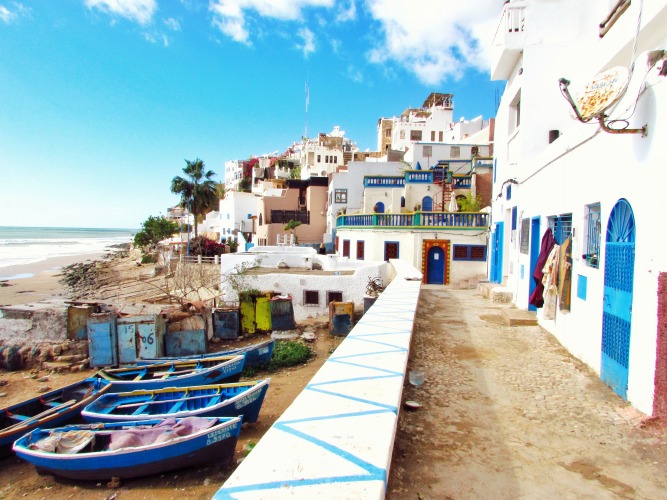

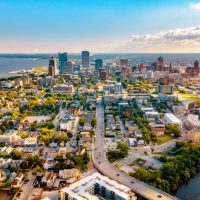


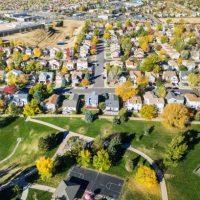






I have been to Morocco four times, for a total of almost four months. I stayed mostly in Merzouga, the Tinghir area and Marrakech, but traveled as well. This article seems silly and at times false.
The Berbers (aka Amazigh) were in Morocco since at least 2000 BC. “Moors” is a vague term coined by Europeans that comes from “Mauri,” the name of one of the Berber tribes. In other words, it is untrue that Spaniards, Jews and Moors “became Berber culture,” although modern Berber tribes show varying degrees of Spanish and Jewish influence. There were both Jewish and Christian Berber clans in Morocco, even after the Arab (Muslim) conquest.
There are not a great number of Americans and Canadians living in Morocco, especially compared to the number of Arabs. Most expats are African and European.
The Saharan desert climate comprises a tiny sliver of the country, and dunes are a small fraction of that. (Have the writers of this article even been to Morocco, or does “backyard” here refer to Algeria and Mauritania?)
Probably the most ludicrous section is “Camels.” I love camels, and lived where there were many of them, but they are common only in a fairly small portion of the country. They are not used as taxis, and riding them is not a “cultural norm.” Even for most of those who own them; they more often carry possessions or tourists. Donkeys are far more widespread beasts of burden.
There is no single distinctive Berber rug, but rather several styles, and “woven using a Moroccan kilim” makes no sense since kilim is the rug, not the tool to make it. Traditional Berber rugs include both kilim and knotted types.
I will stop there.
Eating pigeon is not a con of Morocco. No one is forced to eat it, nor is there anything inherently bad about doing so!
Terrorism in Morocco is rare, with only two large-scale attacks in the last 20 years. The US State Department travel advisory level for the country is the same as for most of Europe. Traffic is more of a risk than terrorism.
“Porn is illegal” is one of the eight cons? Seriously? You can’t think of anything else that might rank in the top 8 problems, such as fakes for sale, the illegality of homosexuality, the problems associated with female Westerners having male Moroccan friends, or even dealing with squat toilets? I know a Moroccan guy who watches porn, so it can’t be that much of a problem!
“As the hijab is a Muslim tradition, only those who are representative of this religion should sport the covering out of respect.
“That being said, you might be asked to cover your hair in certain instances, such as when entering a Muslim mosque”
It shows no disrespect to wear a hijab; if it did, the 2nd paragraph would make no sense!!! And most people who know anything about Morocco are aware that there are only a few mosques in the whole country that allow non-Muslims to enter. (Isn’t “Muslim mosque” a little repetitive? Are there any non-Muslim mosques?)
I live in Morocco and I have tattoos, I have a great job and no1 has been bad to me just cause I have tattoos. i bet you have not even been to the country and you decided to write this? stop scaring people. and they are allowed to eat whatever they want no1 is forcing to try their food. and yes people shouldn’t be addicted to porn or sex how is making porn illegal a con?
Morocco is a safe country for tourism and it also has a very rich culture between the traditional people who live in big cities and people who live in the mountains and on trips to enjoy the magic of Morocco you can start your adventure from several points such as Casablanca, Marrakech, Fez, Tangier, to get to know the imperial cities of Morocco and with an adventure of living a night in the Merzouga desert with a camel ride and then visiting the kasbahs of the south east, which are still some towns where the native people of Morocco live, so to finish the trip of getting to know the red city, Marrakech is a city of culture and parties, there will always be everything in that beautiful city.